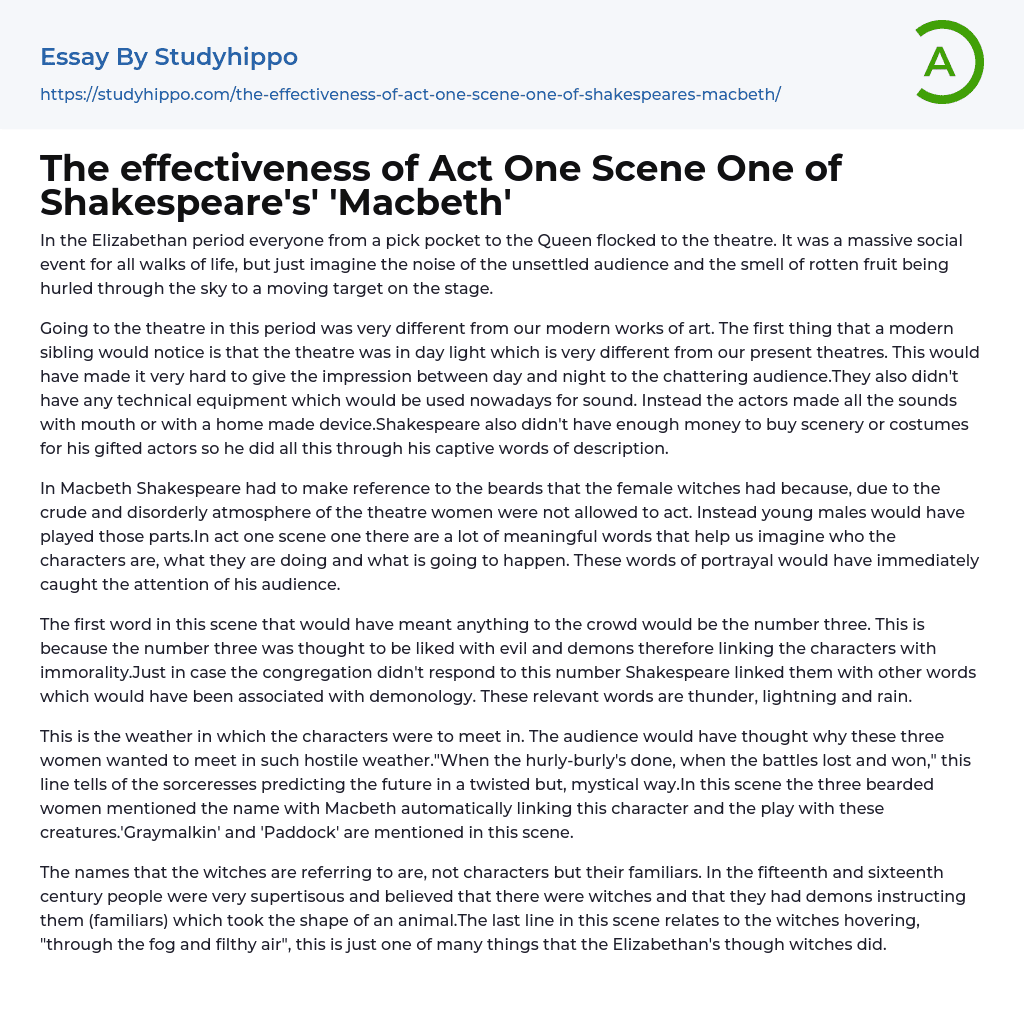

The effectiveness of Act One Scene One of Shakespeare’s’ ‘Macbeth’ Essay Example
During Elizabethan times, the theatre attracted a wide range of individuals, from petty thieves to Her Majesty herself. This cultural event was popular amongst people from different social backgrounds. However, one can only imagine the raucous atmosphere created by unquiet spectators throwing spoiled fruits at actors on stage.
Visiting the theatre during earlier times was unlike our contemporary experience of art. The most striking difference was that performances were held during daylight hours, which contrasted greatly from present-day theatres. This made it quite challenging to create the illusion of different times of day for the talkative crowds. Additionally, advanced sound equipment, which is employed in modern productions, was not available. Instead, actors generated all the necessary sounds using only their voices or rudimentary homemade tools. Due to limited funds, Shakespeare couldn't provide hi
...s talented cast with elaborate costumes and sets, relying only on his words to paint vivid imagery.
Shakespeare had to mention the beards of the female witches in Macbeth as women were not permitted to act during that time. Therefore, young men would have played those roles. In act one scene one, there are significant words used for characterization and foreshadowing which would have grabbed the attention of the audience amidst the disorderly environment of the theatre.
In this scene, the initial word of significance for the audience was "three". This is due to its connection with malevolence and demons, which in turn related to the characters' wickedness. To reinforce this association with demonology, Shakespeare incorporated additional words such as thunder, lightning, and rain, in case the viewers did not react to the number three.
The characters were to meet in hostile weather, whic
may have seemed odd to the audience. The three bearded women predicted the future in a twisted, mystical way with the line "When the hurly-burly's done, when the battles lost and won." During this scene, Macbeth was automatically linked with these creatures when the three women mentioned his name. Additionally, "Graymalkin" and "Paddock" were also mentioned during this scene.
During the fifteenth and sixteenth century, people were extremely superstitious and believed in witches who had demons instructing them in the form of an animal, known as a familiar. The names mentioned by the witches in this scene refer to their familiars, not characters. The final line in this scene implies that according to Elizabethan beliefs, witches could hover through the fog and polluted air, which was among many other things they were believed to do.
- Banquo essays
- Macbeth Ambition essays
- Theatre Of The Absurd essays
- Playwright essays
- Scotland essays
- Tennessee williams essays
- A Doll's House essays
- A Midsummer Night's Dream essays
- A raisin in the sun essays
- A Streetcar Named Desire essays
- An Inspector Calls essays
- Death of a salesman essays
- Everyman essays
- Fences essays
- Hamlet essays
- Hedda Gabler essays
- Iago essays
- King Lear essays
- Macbeth essays
- Much ado about nothing essays
- Oedipus Rex essays
- Oedipus The King essays
- Othello essays
- Pygmalion essays
- Romeo And Juliet essays
- Tartuffe essays
- The glass menagerie essays
- The Importance of Being Earnest essays
- The Merchant Of Venice essays
- The Taming of The Shrew essays
- Twelfth Night essays
- Waiting For Godot essays
- Aesthetics essays
- Art History essays
- Artist essays
- ballet essays
- Body Art essays
- Color essays
- Concert Review essays
- Creativity essays
- Cultural Anthropology essays
- Ethnography essays
- Harlem Renaissance essays
- Heritage essays
- Modernism essays
- Mona Lisa essays
- Pastoral essays
- Postmodernism essays
- Realism essays
- Symbolism essays



